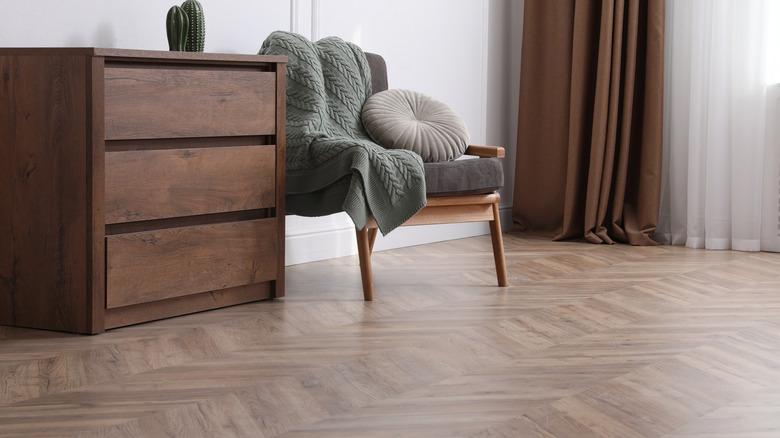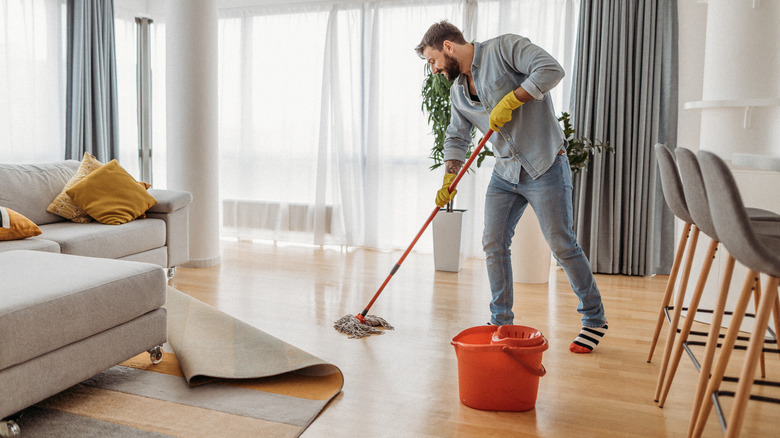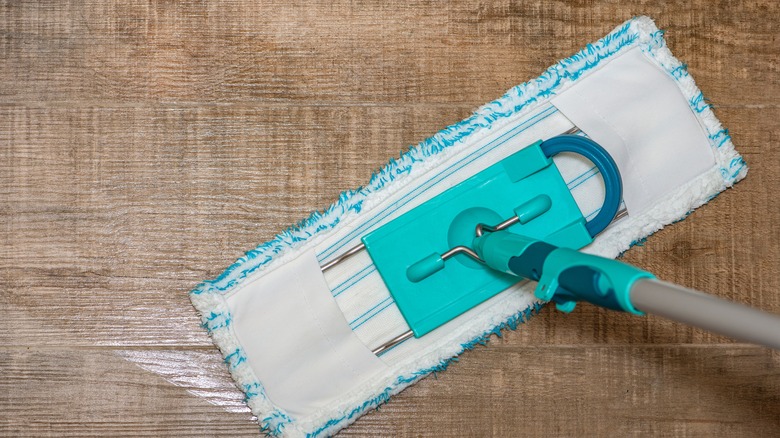Keep Your Vinyl Floors Looking Fresh And Fade-Free With These Helpful Tips
We may receive a commission on purchases made from links.
Have you noticed your vinyl floors look a bit less shiny and new than they used to? There are various reasons why vinyl floors fade over time, including damage from direct sunlight (especially if you have spots of discoloration) and poor use of adhesives when applying them. One of the most common reasons for fading is the use of the wrong cleaning agents.
Vinyl floors are very durable and tend to be long-lasting when maintained well. They tend to last 10 years or longer, thanks to their resistance to cracking and routine wear and tear. Some products last longer than others, thanks to the higher quality of plastics within them. Yet, as durable as they are, fading isn't an attractive quality for many flooring products, and that's why some people may seek to replace these long before they wear out. They just don't maintain their good looks long in some situations.
If you've invested in new vinyl flooring and want to prevent fading, you must understand the proper method for caring for your floors based on manufacturer recommendations. From there, you also want to understand how various chemicals interact with vinyl floors, as that can help you avoid using products that could break down the surface shine, causing that off-coloring that you don't want. Using a safe cleaning agent for vinyl floors will make a big difference.
What's causing your vinyl floors to fade may be in your mop bucket
How you're mopping your floors could be contributing to the damage to the vinyl, even if you're careful and thorough during the process. First, know what types of cleaning agents you should avoid using on vinyl floors. Most often, you should not use bleach-based products. You should also avoid any type of ammonia-based cleaning product. Both will break down the exterior finish of the vinyl floors, causing dullness and creating areas of potential damage to the material itself. Additionally, avoid using any type of scrubber or abrasive material (this is not where you want to pull out the old-school cleanser or scouring pad).
Why is that? While many of today's vinyl products are waterproof or water-resistant, they are still impacted by the pH in the water you use to clean them. The pH level of water is a measurement of how acidic or alkaline the water is, with distilled water being considered a neutral product. If the water is too acidic, which is generally below five, or too alkaline, which is above nine, it can cause damage to the adhesive on the surface of the floor. It also may distort the shape and may cause a dulling of the material. While the water is important, so are the cleaning agents you put into it, which can shift the overall pH level too.
Protecting vinyl floors from fading is easier than you think
There are several simple ways to clean vinyl floors that will help to give you the cleanliness you're after while also protecting the surface from damage and dulling. One option is to keep it as basic as possible. Mix a cup of white vinegar into a gallon of warm water and then use that to clean the surface of the vinyl floor. With this option, you'll want to keep the surface as dry as possible by wringing out the mop well. You can also add a few drops of dish detergent to the mop to help with dirtier surfaces. If there are areas of significant dirt buildup, create a paste of baking soda and water to get it to the consistency of toothpaste. Apply that on the area that needs treatment and rub gently. Avoid any abrasive pressure.
If vinegar isn't enough to keep up with the kids, dogs, and overall traffic in your space, it may be time to look for a cleaning agent designed to provide the level of protection you need. Ideally, you should seek out a cleaning product that's designed for vinyl floors themselves. Various products exist, such as the Bona Pro Series, which is available on Amazon for around $30, and the Rejuvenate Floor Cleaner, which is available at Lowes for around $10. Seek out products that are neutral floor cleaners since these tend to be safer for routine use.


